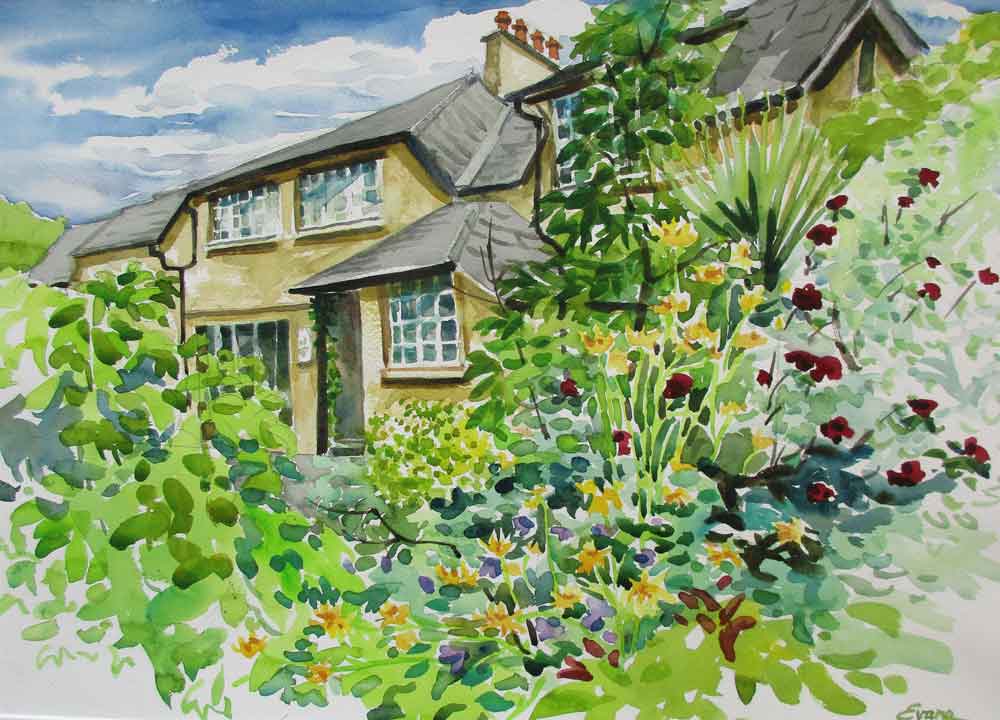Like many of you, I’ve started a garden. If all grows well, I expect to have green beans, carrots, tomatoes, peppers, potatoes, spinach, basil, two kinds of parsley, several sorts of lettuce, zinnias and marigolds in a few months. It is a faithful yet timorous act to nestle tiny seeds into teeny pots, water and watch them gradually sprout; then, after weeks, to transplant these tenuous babies into raised beds, hoping Maine will not get a surprising May frost to slaughter them all.
Life is like a garden. You dig a path, plant projects that seem good, dedicated to doing things well for your family, yourself, mankind, and the universe. You follow leads that come to you in good conscience. But suddenly it’s as if everything goes horribly wrong–as if aphids and caterpillars invaded the soil of your unselfish intentions and gobbled up the good seedlings which you worked so hard to grow. Everything seems a disaster. Not just one or two bad things happen, but dozens, one on top of another. You didn’t ask for this! You could make a long list of all the evil that befell you! But why bother? It would only depress you all the more (though I have upon occasion made such lists in order to search for pattern or purpose). But it does no good to dwell on pernicious tallies. You will ask yourself, as Job and I have done, why has all this come to pass? It’s as if after the pests devoured your plantings, an avalanche of destructive rocks stormed down on your garden of grandeur, leaving you grappling for answers in a pile of rubble.
Malevolence seems to have a power over which humans have no control. We have a pretty clear idea of what good is and how to achieve it (whether we reach it or not is another matter), but evil seems sneaky, subtle, onerous; overcoming it can seem puzzling. Evil seems to come out of nowhere and land on us randomly. There’s a clue here, however: it comes out of nowhere. It comes out of nothingness. Its source is nothing. God, omnipotent Good, certainly didn’t ordain evil. So where does evil come from? Can there be a second omnipotence? Then neither would be omnipotent! Two opposing Alls–one good and the other evil–seems impossible. When I think of love, truth, beauty, goodness, integrity, honesty, gentleness, kindness, justice, freedom, intelligence, the grace of spiritual insights, and the amazing flow of creative ideas, I cannot imagine evil as a force.
Before I was a teen (and long since) I’d been asking myself–and numerous Sunday School teachers–this age-old question, or some version thereof: How can evil even seem to be? Religious study and life experience have taught me to trust that God, Good, is supreme, that there is no other power. So how can evil even seem to be? Where does evil’s seeming originate? How can there be place for evil if God, Good, is All? God by His/Her very nature would not, could not, know or create something so unlike Himself/Herself. Especially if one accepts the first chapter of Genesis’ statement: “God saw everything that he had made and behold it was very good.” In Islam God, or Allah, is seen as omnipotent, all-merciful. In Buddhism the path to Nirvana comes through enlightenment that leads to liberation from suffering or evil. Sikhs aim to unite with God’s good Oneness. In no major religion that I know of is evil considered God’s gift to mankind. Yet evil appears throughout the mortal world.
Evil and its companion culprit, fear, go hand-in-hand, float subtly into thought, grow like weeds if we let them. Our job is to consistently weed them out of our thinking, just as we faithfully weed our gardens. Thought is the nurturing soil and what we allow to grow in it is what blooms. Feeding thought with whatever is God-like, good, truthful, loving, just, unselfish, cultivates healthy growth. Aiming to better understand God, Spirit, and our spiritual selfhood as God’s image and likeness, comes close to disintegrating the age-old question about evil. Knowing and trusting God wipes away evil’s fears and worry. Like my dad once told me: “Worry is distrust of God.” Whacking worrisome weeds of evil when they first appear in our thought-garden enables us to notice more good–even if only tiny sprouts at first. The more we trust God, omnipotent Good, the more we see good. Even when the mortal scene suggests otherwise. I’ve long relied on the psalmist words: “Trust in the Lord with all your heart and lean not unto your own understanding; in all your ways acknowledge him and he shall direct thy path.” Our limited mortal understanding may cause us to grapple over the question of good and evil as long as we walk this earth. But trusting God more each day enables us to grow spiritually, to love more, to become more courageous and honest–to bloom in a real garden of grandeur.
If ever there were a visually grand garden you’ll find it in Ireland!
